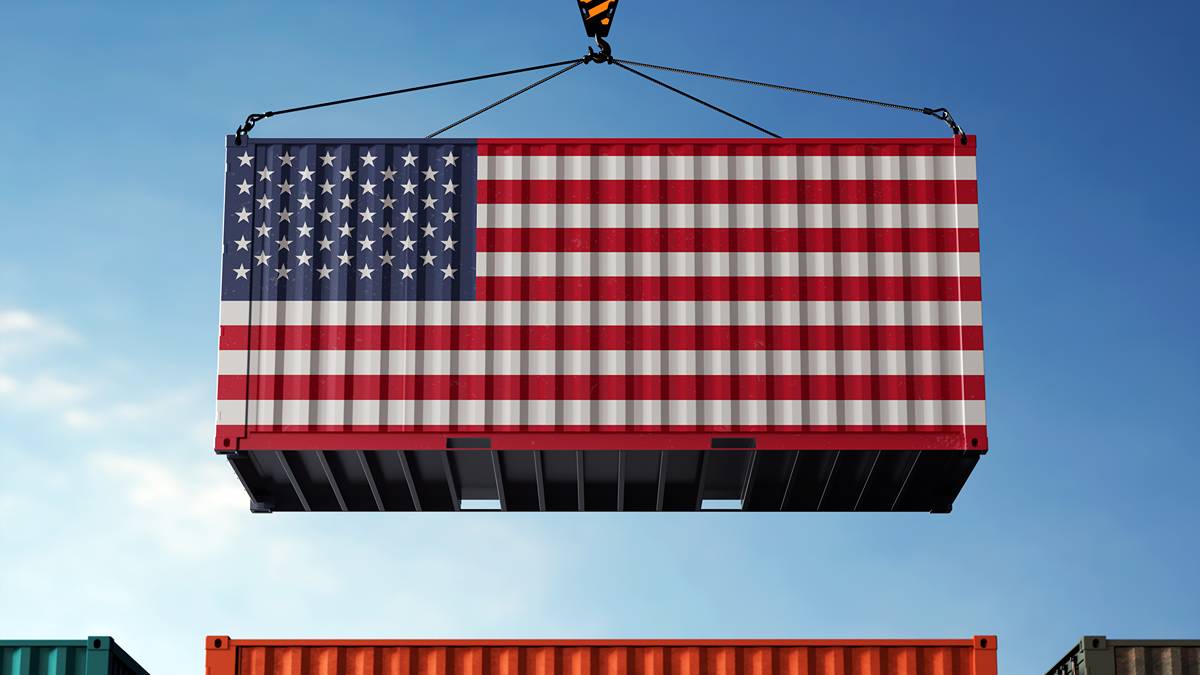Criterion: Liberation Day delivers some not so tariff-ic share surprises

Welcome to Fortress America, formerly the land of the free (trade) Pic via Getty.
- Trump’s 10% tariff slug on Australia could be worse, but harsher beef and pharmaceutical imposts could yet be imposed
- Australia is likely to be more affected via the impact on our Asian trading partners
- Investor attention has turned to stock-specific ramifications
Donald Trump described Liberation Day as such because the tariffs will “end the decades of unfair trade practices that have been ripping off American workers”.
We’ll wait and see whether the tariffs revive the nation’s rust belts – or spur a not so tariff-ic bout of inflation or a recession. Or both.
The punitive imposts sure have been ‘liberating’ in another way: freeing share investors from the burden of managing trillions of dollars of now-vanished wealth.
Fortunately, Australia wasn’t part of Trump’s naughty list of countries slugged with tariffs of up to 49%.
We only must cope with the blanket 10%, foisted on America’s friends and foes alike.
But in his rambling opening discourse, Trump moved swiftly to castigate the lack of reciprocal beef trade under the “protecting farmers and ranchers” category.
As well having a beef about our beef – our biggest US export – Trump is cranky about our beloved Pharmaceutical Benefits Scheme (PBS).
So, expect some ‘special treatment’ in future.
Investors are rattled
Thursday morning’s Trump-nouncement put a shiver up the spine of a stock market already spooked by other aspects of Cyclone Donald’s early days.
Put in context, Australia’s exports to the US – roughly $37 billion a year – are a drop in the (Pacific) ocean compared with our total trade.
It’s also far less than the $88 billion of goods and services from our American (supposed) friends, which is why we didn’t make the naughty list.
The tariffs are more likely to hurt us indirectly, because of the heavy imposts on our trading partners, notably China.
In short, if they can’t export competitively to the US their economies are likely to slow – and they won’t need so much of our iron ore and coal.
Cettire: the biggest loser
On Liberation Day, the market’s focus turned to specific stocks that are likely to be affected.
Shares in posh online goods purveyor Cettire (ASX:CTT) led the declines on Thursday, tumbling up to 20%.
In the December half, 41% of Cettire’s sales related to goods made in Europe and sold in the US.
For the time being, Cettire will continue to enjoy a tariff exemption for shipments valued below US$800, while rival luxury retailers will be similarly affected.
Shares in glove maker Ansell (ASX:ANN) tumbled 14%.
Ansell has 14 manufacturing sites across nine countries, including China, with a small Mexican presence.
“For some time now, we have been working on a strategy to minimise any single country dependence, no matter what country that maybe,” CEO Neil Salmon told a recent investor webinar.
Shares in kettle maker Breville (ASX:BRG) were up to 12% off the boil for a similar reason: 90% of the company’s goods are made in China and 45% of them are sold in the US.
Four-wheel drive accessories provider ARB Corporation (ASX:ARB) faces a potentially tricky time, with 10% of its sales sourced from the US. Trump has plonked a 25% tariff on foreign cars and auto parts.
All is not what it seems
As more granular details of America’s new era of protectionism emerge, so too will stock-specific impacts.
It’s still to be early to be definitive and the likely losers might turn out to be winners.
The US is an important market for winemaker Treasury Wine Estates (ASX:TWE) , but it grows a lot of plonk there as well.
Bluescope Steel (ASX:BSL) faces a 25% blanket tariff on aluminum and steel.
But Bluescope produces more than three million tonnes of steel a year at its Northstar facility in Ohio – and exports a mere 300,000 tonnes from here to the US.
Ansell’s Salmon says US duties could become a tailwind, as many rivals depend more on sourcing goods from China than his company.
Similarly, sleep apnoea device leader Resmed (ASX:RMD) says it’s better placed than a rival that manufactures in Mexico.
The tariff hit could also spur faster Reserve Bank rate cuts, which is positive for sectors such as infrastructure and property trusts.
We can’t be sure whether the market’s harsh treatment of the likes of Cettire and Ansell was justified.
But almost certainly, buying opportunities will emerge from exaggerated selloffs.
UNLOCK INSIGHTS
Discover the untold stories of emerging ASX stocks.
Daily news and expert analysis, it's free to subscribe.
By proceeding, you confirm you understand that we handle personal information in accordance with our Privacy Policy.








